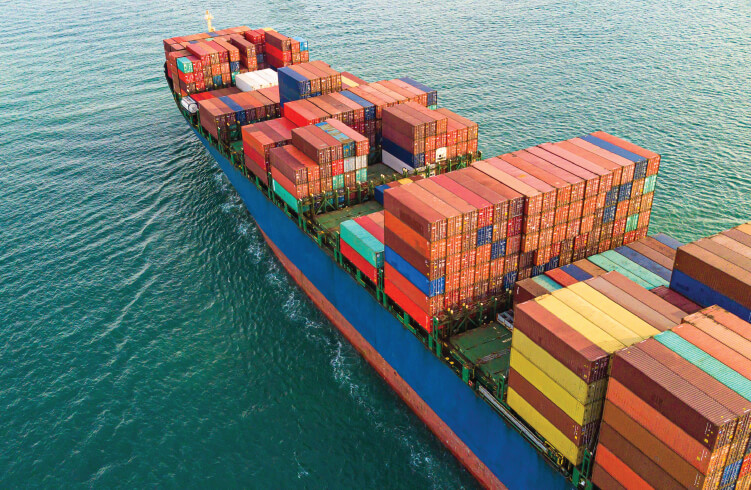State of the Union: Ocean Freight
While the term “ocean freight” is certainly not one that is used in common conversation, the phrase “shipping delays” is. In the post-COVID world, consumers have felt the impact of delays in nearly every commodity they purchase – but what they may not realize is that the impact is even more significant for individuals and families who are relocating internationally.
What is ocean freight?
Ocean freight refers to the transportation of goods by sea. This mode of transportation involves loading goods into shipping containers, which are then transported on large cargo ships across the ocean to their final destination. Many of the products you use on a daily basis are manufactured overseas and transported by sea to your country. This includes everything from clothing and electronics to food and household goods.
Ocean freight also plays a role in determining the prices of goods. The cost of shipping goods by sea is affected by a range of factors, including fuel prices, shipping demand, and port fees. These costs are ultimately passed on to the consumer, impacting the price of goods and services in the marketplace.
What does ocean freight have to do with my international move?
The answer is simple: a lot!
Particularly if the economy is booming, the shipping market for household goods can be impacted dramatically:
- Increased Demand: During and immediately after COVID, there was very little movement of ocean freight. Once vessels began to sail once more, demand skyrocketed, and vessels – as well as the equipment to load goods onto them – were overbooked and in short supply.
- Significant Delays: As you can imagine, there is limited space on a cargo ship. When it comes to prioritizing space, vessels will load commodities before household goods. This means that household shipments can often take twice as long (or more) to make it to their destinations.
- Price Increases: In strong economic times when the demand for goods and services is at its peak, household good shipments experience increases in price due to the demand for space on a cargo ship. These price increases – which, in the current environment, can reach as high as 6x – are passed directly to the individual or family who is shipping their goods overseas.
What is the outlook for ocean freight?
Unfortunately, there are many variables, and just as many unknowns, in the world of ocean freight. This creates confusion among those looking to move overseas: even after setting a move date, agreeing to a price, and signing a contract with a moving company, shipments can be delayed multiple times, resulting in additional – usually, unplanned – costs for temporary storage. This is compounded by changes in ocean freight pricing due to global fluctuations in fuel prices. Thus, the outlook is, in short, unpredictable.
Given the environment, what can I do to best plan for my international move?
Even in a congested shipping environment, those looking to move themselves or their families overseas can significantly influence the outcome of their move by following these tips:
- Begin the process of looking for a moving company early: The more advance time you take to investigate options, the more information you can gather to plan as best you can. Ocean freight can’t be booked until 30 days in advance of your target move date; plan to start your research well before.
- Evaluate options based on more than just price: Given the limited supply of space on cargo ships, approach every price quote you receive with caution. Due to potential delays, the price you are quoted may not be the price you ultimately pay; don’t assume that it is locked in.
- Review the contract in detail: Are there concessions made for current environment? Is there a generous range given in delivery dates? Transparency in the contract shows that the company is acknowledging the unpredictability of the current environment, as opposed to overpromising something that they may not be able to deliver.
- Ask potential movers about their response to potential shipping delays: What solutions can they offer in the event that shipments are delayed due to lack of availability? Ask for them to educate you on the various options, such as temporary storage, and associated costs.
- Ask for proactive communication: Because ocean freight can be booked 30 days in advance of your target move date, your chosen moving company should be able to inform you of potential delays weeks in advance.
How Planes can help:
As a member of FIDI, Planes is one of the top international relocation companies in the world. We are held to the highest standards of quality, safety, and customer experience. Our team prides itself on taking an educational approach to every move, disclosing information about current conditions and empowering our customers to choose from options that work best for their timeline and budget – all before a move is booked. We are transparent and overcommunicative with our customers throughout the entire process, bringing them peace of mind and helping them move forward with confidence.
Contact an ExpertRelated Posts

Global Retail: Opening Stores in Foreign Countries
U.S.-based retailers have long realized that relying on domestic growth will not yield shareholder return to the level that meets the street’s
Read More

4 Tips to Make Moving Day Stress-Free
Moving. It’s something nearly all companies go through. Company growth and changes often result in the need for larger spaces, upgrades, or maybe
Read More

How Planes Move Management™ Can Make Your Corporate Move a Breeze
It’s well known that one of life’s most stressful events is moving. The many aspects of moving your family to a new home – how to prepare, how
Read More

